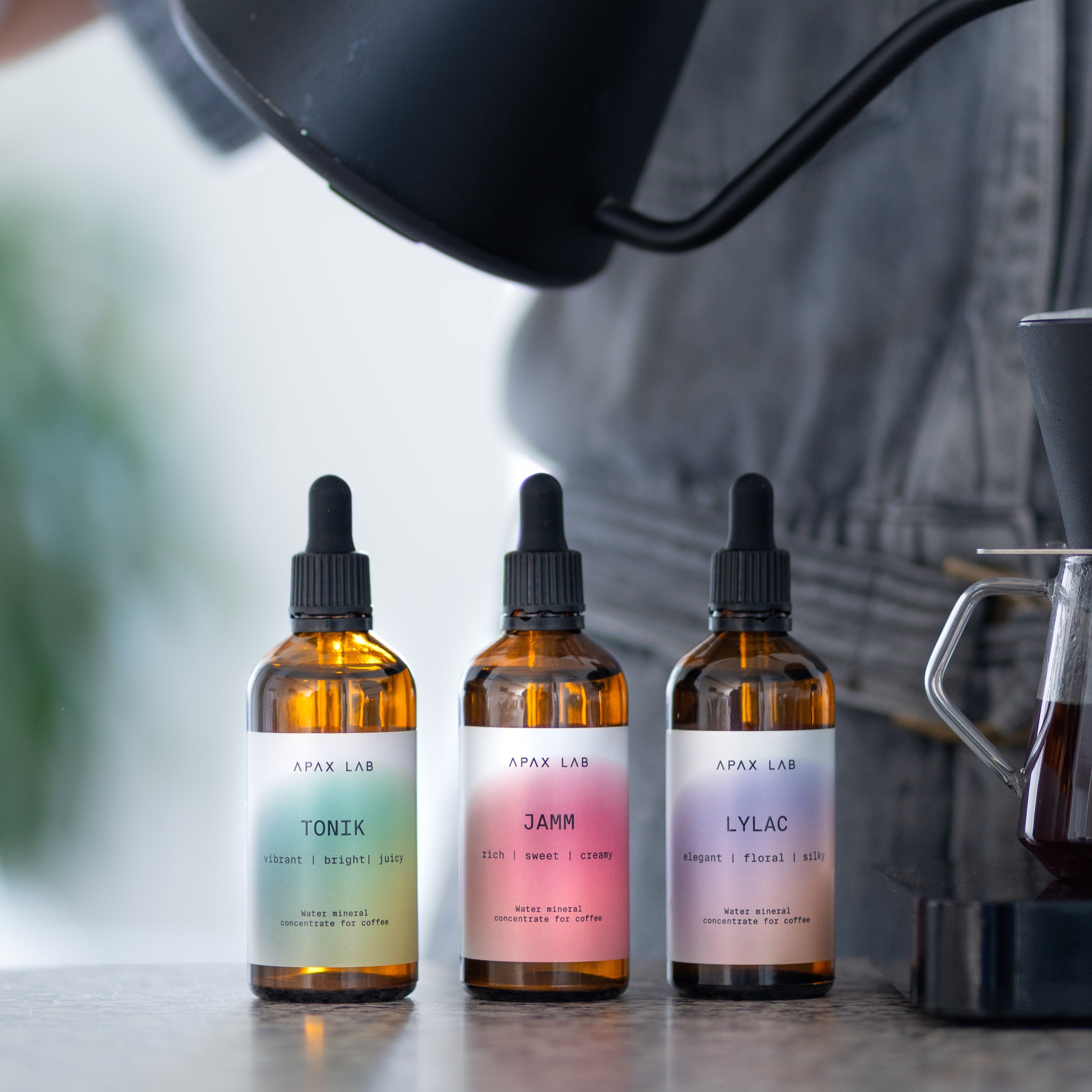Getting Started with APAX LAB
APAX LAB are high-precision mineral concentrates designed to add to coffee directly or to build water for coffee brewing. Think of these minerals as seasoning — they shape clarity, sweetness, and balance in every cup. APAX LAB makes it easy to reproduce world-class water anywhere, from competition stages to home kitchens.
Simply add the recommended amount of concentrate to distilled or demineralised water, or directly into your coffee. Each recipe is pre-calibrated, so no chemistry degree required. Refer to the user guide that comes with each box set for more details, or to the Recipe Calculator page of our website.
- TONIK : formulated to enhance the vibrant acidity and bring a crisp, juicy kick to your brews. With just a few drops, you can unlock brightness and clarity that make washed coffees and lively fruit-forward profiles shine.
- JAMM: formulated to bring roundness and will accentuate the lingering sweetness and creamy mouthfeel of your brew. With just a few drops, it enhances body and softens sharp edges, delivering a smooth and full-flavoured cup.
- LYLAC: designed to extend the finish and highlight delicate aromatics in your coffee. It refines texture, reduces dryness, and reveals a silky, elegant cup with a long, clean aftertaste.
Yes! Our profiles work very well on their own, but they have also been designed to be blended together to achieve more specific results.
For example, to lift both the floral notes and the brightness of your coffee, you could use a blend of TONIK and LYLAC.
There is no right or wrong when blending, we recommend experimenting and adjusting the recipes to your own taste! If you would prefer to get started with more guidance, you can refer to our recipe guide to start with our team’s recommended guidelines.
Our mineral concentrates are versatile and designed to enhance certain attributes of coffee. They can be applied to any type of coffee in various ways. These concentrates pair well with filter coffee, espresso, and all milk-based coffees.
We would recommend brewing your first coffee with demineralised water, then split it into 4 cups. One will be the control cup, with no added minerals and in the 3 others, simply add a few drops of Tonik, Jamm, or Lylac. This will allow you to see how minerals shape a different expression of the same coffee, and how they will impact the flavour profile. This is the best and quickest test to get your head around the different minerals.
Brewing with APAX LAB at Home
All our profiles are designed for both espresso or filter and for any kind of roast and processing method. They simply will deliver on the promised attributes, regardless of the coffee you use.
That said, you really need to try JAMM in your latte or flat white!
We generally recommend using demineralised water to control the mineral content of your brew water and ensure consistency. However, access to demineralised water isn’t always easy. In that case, we suggest using a soft water base (ideally under 30ppm) and considering that mineral content when remineralising your water.Example: If you’re using water at 60 ppm, use only 1 to 2 g of APAX LAB per litre of water to reach the target of 90 to 120 ppm.
APAX is designed for distilled or demineralised water. Tap water varies too much in mineral composition, which makes recipes unpredictable. For consistent results, start with a clean base.
Soft waters, containing low mineral concentrations are however suitable as a base. Simply deduct the existing concentration of your water to the amount of APAX you want to use.
Example: if your base water contains 30ppm and you want to go to 90ppm total, simply add 2g APAX/L of water (60ppm).
Yes and No - you can use a small amount of APAX into your espresso machine (1g/L max), but above that level, certain minerals / ions can damage the boiler of the machine in the long run.
1g/L is safe, but we would suggest to add a few drops after the extraction instead.
Use the dosing dropper provided. Count the number of drops or measure the grams into your coffee, jug or bottle of distilled water, stir, and you’re ready to go!
Yes — most people notice improved sweetness, clarity, and balance on the very first brew. Even non-coffee drinkers can taste the difference when the same coffee is brewed with and without APAX.
Not for everyday use — our recipes are calibrated to be foolproof. For those who want to explore further, tools like a TDS meter can help track consistency.
APAX LAB in Cafés / Behind the Bar
It removes water as a variable. Whether your morning barista or your evening closer is on bar, they’re brewing with the exact same water, every time.
Even more so! Our products help baristas get the most out of the coffees their work with. There is nothing worse for customers than paying a premium for a coffee and not be entirely convinced it was worth it. APAX turns great coffees into exceptional brews. This is why over 1000 cafés worldwide already use APAX.
Most cafés use 5 to 10 L containers. Add the specified dose of APAX, stir, and refill their kettles directly from that batch.
No, our products are not designed to be used in commercial machines. For espressos in a café environment, your best option is to add a few drops post-extraction.
Treat it like a mise-en-place task. Show staff how to measure, add, and label water batches in the morning. Our guides and infographics make this process fast and easy to adopt. We can also set up a call with you and provide online training for you and your team.
Filtration cleans your water, but it doesn’t optimise it for flavour. APAX can be used alongside filtration and lets you build water precisely for your coffee, rather than just removing contaminants. It’s the difference between “acceptable” and “competition-ready.”
Technical Questions
The “cloudiness” in these recipes is due to the combination of calcium and bicarbonate. Together they temporarily precipitate at the bottom of the bottle. Once you shake it, they will redissolve instantly.
LYLAC contains traces of calcium that can react with the sulfate present in it to create calcium sulfate particles. These won’t redissolve after shaking, but they do not alter the performance of the product other than visually.
Our products have a 3-year shelf-life after manufacturing. Once opened, we recommend using them within 12 months. The mineral concentration is so high that the stability is excellent over time.
Keep the bottles closed, away from heat and direct sunlight. A cool, dry place is best. Do not refrigerate, as it can create more precipitations.
Our products are precise enough that you can trust your calculations by counting the number of drops or measuring the amount of grams you use. Alternatively, a TDS meter can confirm approximate mineral concentration, but taste is the ultimate check.
TDS meters are calibrated to measure the mineral concentration in a water temperature of approximately 21 degrees. If your water is too hot when you measure then the reading will be higher and vice and versa in cooler water.
Minerals & Coffee Science
Contrarily to common belief, minerals play little to no impact in the extraction process of coffee. Instead, they play a role on our taste receptors to increase or decrease the perception of different attributes in coffees and therefore, its flavours.
The impact of different ions on the flavours of coffee is a topic we have been researching since 2018.
You can learn how they all impact different attributes in coffee by reading this article.
- Hardness = calcium + magnesium.
- Alkalinity = buffer capacity (mainly bicarbonates).
- TDS = total dissolved solids (all minerals combined).
Knowing the Hardness and Alkalinity of your water are important in order to protect an espresso machine, but in no way these metrics can give you an indication of the water quality and what you can expect from it. Water is unfortunately much more complex than that, and we’ve done the hard work for you in creating those ready-to-use recipes.
Learn more about it in this article.

